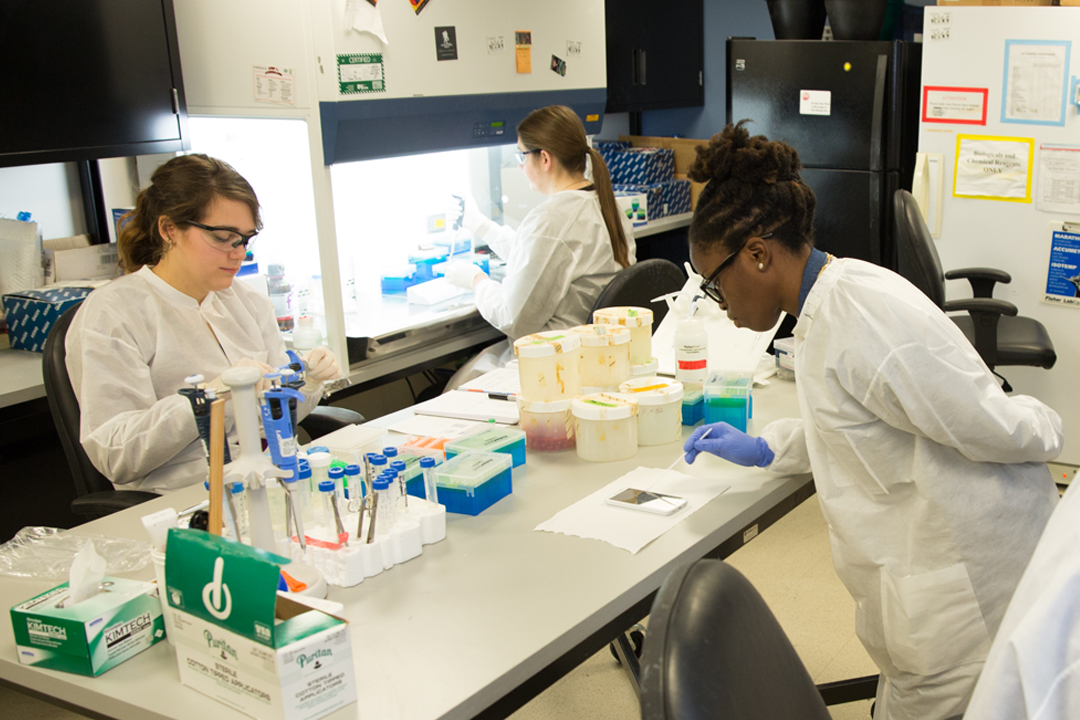MFS in Forensic Molecular Biology
The Master of Forensic Sciences in Forensic Molecular Biology (FMB) prepares students to work in crime laboratories as DNA analysts and technical leaders. Students pursuing the FEPAC-accredited degree learn to apply rigorous research and analysis skills to synthesize, interpret and understand crime scene evidence. Using state-of-the-art lab facilities, students learn chemical, physical, immunological and microscopic methods, and the theoretical and practical aspects of advanced methods, such as DNA extraction and data interpretation.
In their coursework, students might find themselves identifying body fluids at recreated crime scenes or participating in mock court cases. This simulated first-hand experience develops the ability to collect, protect and preserve evidence, as well serve as an expert witness in testimony.
"We were able to go through the analysis as if we were real analysts on this case. Once we analyzed the data, we were able to put it through a [simulated DNA] database."
Sathya Prakash Harihar
MS '20
Program Objectives
Graduates develop the knowledge and skills needed to work in a crime forensic laboratory. Specifically, graduates will:
- Obtain hands-on physical evidence analysis experience, such as the design, development and validation of forensic DNA analysis
- Improve critical thinking skills to evaluate forensic evidence and scientific literature
- Develop presentation and writing skills for research, report writing and courtroom testimony
- Understand the breadth of forensic science disciplines and their application to criminal justice
- Comprehend the legal and ethical principles of forensic science
Focus Areas
Students choose from required and elective courses in five subject areas:
- Chemical, Physical, Immunological and Microscopic Methods
-
Students combine disciplines to examine and identify body fluid stains at a crime scene and in the laboratory.
- Theoretical and Practical Aspects of Advanced Methods in Forensic Molecular Biology
-
Students learn methods of DNA extraction, quantitation, and amplification (of short tandem repeat markers and mitochondrial DNA), fragment analysis, DNA sequencing, data interpretation, mixture deconvolution and skills to evaluate population genetics.
- Forensic Physical Sciences
-
Students combine classic investigative examination techniques (such as fingerprinting, firearm and toolmark examination and document examination) with leading approaches used to examine trace evidence (such as glass, soil, paint, hairs and fibers and forensic drug analysis). Students learn the principles of forensic pathology, crime scene investigation and forensic science laboratory management.
- Principles of Criminal Law and Procedure
-
Students learn to prepare and present evidence, how to qualify and prepare expert witnesses and how to testify as an expert witness or present findings in a legal setting.
- Laboratory Classes
-
Students participate in mock cases to establish professional protocols necessary to receive evidence, maintain the chain of custody, analyze the evidence, calculate the statistical significance of a match, issue a report and return the evidence intact. Mock cases include methodology to identify and determine the nature of body fluids, extract, quantify and type the DNA, interpret the data and present it accurately.
Application Requirements
In addition to the Columbian College’s graduate admissions requirements, applicants must meet two requirements to apply for the MFS in Forensic Molecular Biology program:
- Applicant must have a bachelor’s degree in the biological sciences from an accredited college or university.
- Applicant must show 9 credits of completed coursework in certain areas before beginning the program. These courses must be taken as part of the undergraduate curriculum or before registering for graduate classes:
- Biochemistry
- Genetics
- Molecular biology
- Upon completion of the program, in order to meet FBI standards for a forensic DNA technical leader, students will be required to take two courses: Forensic Statistics and Population Genetics.
Complete Application Requirements
Course Requirements
The general requirements stated under Columbian College of Arts and Sciences, Graduate Programs.
37 credits, including 31 credits in required courses and 6 credits in elective courses selected in consultation with the advisor. Successful completion of an independent study project and a master's comprehensive examination also is required.
| Code | Title | Credits |
|---|---|---|
| Required | ||
| FORS 6004 | Fundamentals of Forensic Science I | |
| FORS 6005 | Fundamentals of Forensic Science II | |
| FORS 6020 | Ethics, Professional Responsibility, and Quality Assurance | |
| FORS 6201 | Forensic Biology | |
| FORS 6224 | Criminal Law for Forensic Scientists | |
| FORS 6225 | Statistics for Forensic Scientists | |
| FORS 6241 | Forensic Molecular Biology I | |
| FORS 6242 | Forensic Molecular Biology II | |
| FORS 6243 | Forensic Molecular Biology III | |
| FORS 6247 | Population Genetics | |
| FORS 6292 | Graduate Seminar (taken twice) * | |
| Electives | ||
| Six additional credits selected in consultation with the departmental advisor | ||
| Other requirements | ||
| Successful completion of an independent research project is required. | ||
| Successful completion of a master’s comprehensive examination is required. | ||
| *Students must register for FORS 6292 in their first semester and again after or during the completion of the required independent research project. | ||


